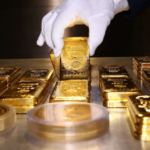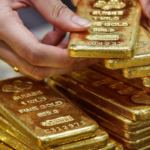In 2024, gold has witnessed a significant surge in prices, driven by multiple global factors. As of October 21, gold was trading around $2,727 per ounce, reflecting an increase of 0.22%
This uptrend is primarily attributed to the role of gold as a safe-haven asset in the face of economic and geopolitical uncertainties. Several key drivers contribute to this rise, including geopolitical tensions, central bank policies, and shifts in the global economic landscape. This article explores these elements and their impact on the precious metal market.
1. Geopolitical Uncertainty as a Primary Driver
One of the most significant drivers of the rise in gold prices in 2024 is the increased geopolitical instability across various regions, particularly in the Middle East. Conflicts in the region, alongside tensions between global superpowers, have amplified economic uncertainty, encouraging investors to flock to safe-haven assets like gold
Historically, gold has been a reliable store of value in times of global turmoil, and this year has been no different.
As the conflict in Israel and the broader Middle East intensified, market volatility increased, and investor sentiment turned risk-averse. In such times, gold’s low correlation with other asset classes, such as equities, makes it particularly appealing. Investors seeking to preserve their wealth during market downturns often turn to gold, leading to an increase in demand and, consequently, higher prices
2. Central Bank Activity: A Key Influence
Another crucial factor behind rising gold prices is the increased buying activity by central banks. In 2024, central banks have continued to diversify their reserves by purchasing gold in response to concerns about currency volatility and the need for stability in their reserves
Countries like China, Russia, and India have all made significant gold purchases, further tightening the market and driving up prices.
In addition, the policy decisions of the U.S. Federal Reserve have had a profound impact on gold prices. The market has been anticipating a series of rate cuts from the Federal Reserve, which would weaken the U.S. dollar and make gold more attractive. Traditionally, when interest rates fall, the opportunity cost of holding non-yielding assets like gold diminishes, boosting its appeal Although the number of anticipated cuts has been adjusted downward, with only one cut expected by the end of the year, the overall sentiment remains bullish on gold as a hedge against inflation and economic uncertainty.
3. Gold’s Decoupling from Real Yields
In previous years, gold’s performance closely mirrored movements in U.S. real yields. A rising yield environment typically makes gold less attractive, as investors can seek higher returns in interest-bearing assets. However, in 2024, there has been a notable decoupling between gold and real yields. Despite rising yields, gold prices have continued to rally. This unusual divergence underscores the strong demand for gold as a hedge against risks that extend beyond monetary policy, particularly inflation and fiscal instability.
4. U.S. Dollar and Inflation Hedging
The weakening of the U.S. dollar has further fueled the rise in gold prices. A strong dollar typically puts downward pressure on gold, as it becomes more expensive for investors holding other currencies. However, despite some fluctuations, the dollar has been relatively weak this year, largely due to expectations of lower interest rates and ongoing fiscal challenges faced by the U.S. government.
Inflation, although moderating compared to its 2022 peak, remains a concern for investors. While U.S. core inflation is projected to decline to 3.5% in 2024, concerns about rising costs of goods and services continue to drive demand for gold as an inflation hedge
. Investors view gold as a long-term store of value that can protect wealth from the erosive effects of inflation, further contributing to its price surge.
5. Gold’s Safe-Haven Appeal and Market Sentiment
Market sentiment surrounding gold remains optimistic. Industry experts and retail investors alike are bullish about gold’s prospects through the end of 2024 and into 2025. Many see further upside potential for gold, with forecasts suggesting that prices could reach as high as $2,500 per ounce by the fourth quarter of 2024
Investor behavior is also influenced by the ongoing de-dollarization trend, where countries and institutions seek to reduce their reliance on the U.S. dollar in international trade and reserves. This shift is spurred by concerns over U.S. fiscal policies and the potential weaponization of the dollar through sanctions. Gold, as a non-sovereign asset, provides an attractive alternative, especially for countries wary of currency risk
6. Future Outlook: Bullish Sentiment for Gold
Looking ahead, the outlook for gold remains bullish. With U.S. fiscal deficit concerns, central bank reserve diversification, and inflationary pressures persisting, many analysts expect the upward trend in gold prices to continue. Some forecasts even suggest that gold could reach new all-time highs of $2,600 per ounce by the end of 2025
. The strong structural drivers of demand for gold—such as geopolitical instability, central bank policies, and inflationary concerns—are unlikely to abate in the short term, making gold an attractive asset for both institutional and retail investors.
In conclusion, the rise in gold prices in 2024 is a reflection of a confluence of global economic and political factors. Geopolitical uncertainty, central bank policies, inflation concerns, and shifts in market sentiment have all contributed to the precious metal’s ongoing rally. As these factors continue to play out, gold is likely to remain a key asset for investors seeking stability and protection against risk in an increasingly volatile world.






